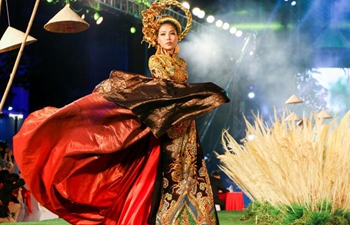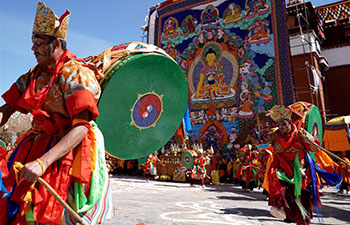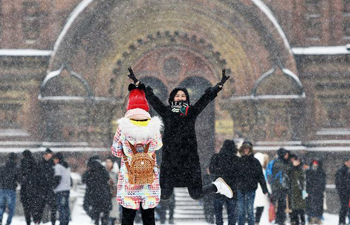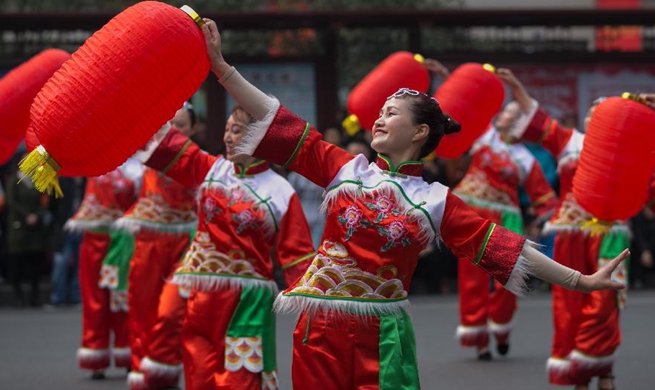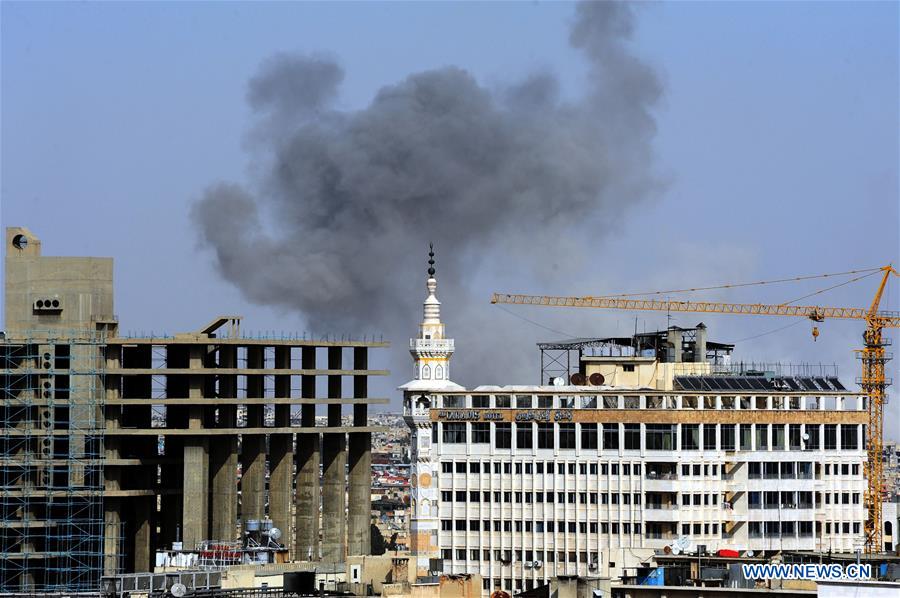
Smoke rises from the rebel-held Eastern Ghouta, east of Damascus, capital of Syria, on March 2, 2018. The Syrian aircraft continued to drop leaflets over the rebel-held Eastern Ghouta on Friday, encouraging civilians to leave and armed militants to lay down their weapons. (Xinhua/Ammar Safarjalani)
DAMASCUS, March 3 (Xinhua) -- The Syrian army advanced on Saturday in the rebel-held Eastern Ghouta countryside of the capital Damascus, capturing a number of areas there. The place has sparked international attention recently.
A military source told Xinhua that the Syrian government forces captured the towns of Otaya, Nashabiyeh, and Herzama in Eastern Ghouta, following battles with the rebels in that area.
Speaking on condition of anonymity, the military source said the achievement is considered as breaking the rebels' defense lines in the southern part of Eastern Ghouta.
Meanwhile, the oppositional Syrian Observatory for Human Rights said the Syrian forces advanced in Eastern Ghouta after 65 Syrian soldiers have been killed in that battle zone since last week.
The London-based watchdog group said the clashes between the Syrian forces and an array of rebel groups in Eastern Ghouta have been ongoing in the eastern and southeastern parts of Eastern Ghouta, which, it said, is besieged by the Syrian army.
It said that rebel-held region has been under an intense government forces' offensive since Feb. 25.
The observatory said the Syrian army captured the town of Shefoniyeh and Otaya and is advancing to lay a siege to leave the rebels between two choices either to withdraw or to surrender.
The observatory, which says it relies on a network of activists on ground, said the Syrian military progress has been achieved over the past 48 hours.
Eastern Ghouta has grabbed international attention recently since the military showdown has started to gain momentum on Feb. 18.
The UN Security Council adopted Resolution 2401 on Feb. 24, which requires all parties in Syria to immediately cease clashes and provides a sustained humanitarian break for at least 30 days across Syria.
Two days later, the Russians demanded a daily humanitarian pause for five hours in Eastern Ghouta specifically.
But those initiatives have slightly reduced the number of rebels' mortar shells on the capital and the Syrian airstrikes and bombardment of Eastern Ghouta.
During the five-hour-long truce, the situation becomes calm, but the military confrontation continues right afterward.
Five days into the humanitarian pause, only two children left Eastern Ghouta as well as a Pakistani couple through the designated humanitarian corridor in Wafidin area, adjacent to the city of Douma, which is under the control of the Islam Army rebels.
The Islam Army said the civilians evacuation from Eastern Ghouta wasn't part of the recent UN Security Council resolution, urging instead for the entry of relief aid to that sprawling area.
But the Russian-backed Syrian army is apparently determined to recapture that enclave, which constitutes the last remaining threat to the capital after the Syrian forces captured all the surroundings of the capital except the Eastern Ghouta.
A day earlier, the Syrian army dropped leaflets over Eastern Ghouta, encouraging civilians to leave and armed militants to lay down their weapons.
Some of the leaflets include small maps showing safe exits out of Eastern Ghouta with instructions on how to leave, while others urge the armed militants to lay down weapons to gain a presidential pardon for those who turn themselves in.
But the ongoing military operations haven't resonated with the Western powers as on Thursday, Britain formally asked the United Nations Human Rights Council to hold an "urgent debate" this week on the situation in Eastern Ghouta, where Britain put forward a draft resolution condemning the conflict in Eastern Ghouta.
Voting on the resolution was postponed till Monday after member states failed to agree on the final text.
The British draft calls for immediate humanitarian access to the Eastern Ghouta and instructs war crimes investigators from the UN-backed Commission of Inquiry for Syria to conduct an investigation into alleged atrocities in the area.
The British text condemned what it described as "the use of chemical weapons by the Syrian authorities against civilians in the Syrian Arab Republic, including against the people living in Eastern Ghouta."
The Syrian government has repeatedly denied using chemical weapons in Eastern Ghouta or elsewhere, saying the West is working to create a pretext to justify targeting Syria.
Meanwhile, the UN said it had not received Syrian government permission to deliver humanitarian aid to Ghouta.
A couple of months ago, al-Qaida-linked groups launched an offensive against a key military base in the city of Harasta in Eastern Ghouta, prompting a counter-military offensive in the area.
These attacks were coupled with rebels' shelling of Damascus, while the government troops retaliated by launching airstrikes targeting rebel positions in Eastern Ghouta.
The situation has dramatically worsened since Feb. 18, creating a humanitarian crisis that has attracted the international attention, as the life in Damascus' eastern neighborhoods near Eastern Ghouta has been largely paralyzed by heavy mortar shellings.
Eastern Ghouta has long been the major threat to Damascus, with rebels keeping launching attacks at the capital.
Four major rebel groups are currently positioned inside Eastern Ghouta, namely the Islam Army, Failaq al-Rahman, Ahrar al-Sham and the Levant Liberation Committee, otherwise known as the al-Qaida-linked Nusra Front.




